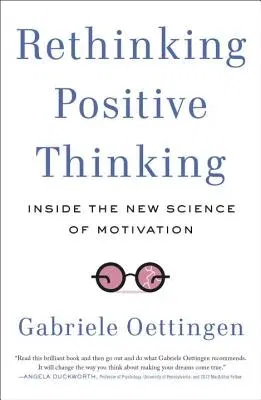"The solution isn't to do away with dreaming and positive thinking.
Rather, it's making the most of our fantasies by brushing them up
against the very thing most of us are taught to ignore or diminish: the
obstacles that stand in our way."
So often in our day-to-day lives we're inundated with advice to "think
positively." From pop music to political speeches to commercials, the
general message is the same: look on the bright side, be optimistic in
the face of adversity, and focus on your dreams. And whether we're
trying to motivate ourselves to lose weight, snag a promotion at work,
or run a marathon, we're told time and time again that focusing on
fulfilling our wishes will make them come true.
Gabriele Oettingen draws on more than twenty years of research in the
science of human motivation to reveal why the conventional wisdom falls
short. The obstacles that we think prevent us from realizing our deepest
wishes can actually lead to their fulfillment. Starry-eyed dreaming
isn't all it's cracked up to be, and as it turns out, dreamers are not
often doers.
While optimism can help us alleviate immediate suffering and persevere
in challenging times, merely dreaming about the future actually makes
people more frustrated and unhappy over the long term and less likely to
achieve their goals. In fact, the pleasure we gain from positive
fantasies allows us to fulfill our wishes virtually, sapping our energy
to perform the hard work of meeting challenges and achieving goals in
real life.
Based on her groundbreaking research and large-scale scientific studies,
Oettingen introduces a new way to visualize the future, calledmental
contrasting. It combines focusing on our dreams with visualizing the
obstacles that stand in our way. By experiencing our dreams in our minds
and facing reality we can address our fears, make concrete plans, and
gain energy to take action.
In Rethinking Positive Thinking, Oettingen applies mental contrasting to
three key areas of personal change-- becoming healthier, nurturing
personal and professional relationships, and performing better at work.
She introduces readers to the key phases of mental contrasting using a
proven four-step process called WOOP--Wish, Outcome, Obstacle, Plan--and
offers advice and exercises on how to best apply this method to daily
life. Through mental contrasting, people in Oettingen's studies have
become significantly more motivated to quit smoking, lose weight, get
better grades, sustain fulfilling relationships, and negotiate more
effectively in business situations.
Whether you are unhappy and struggling with serious problems or you just
want to improve, discover, and explore new opportunities, this book will
deepen your ideas about human motivation and help you boldly chart a new
path ahead.

